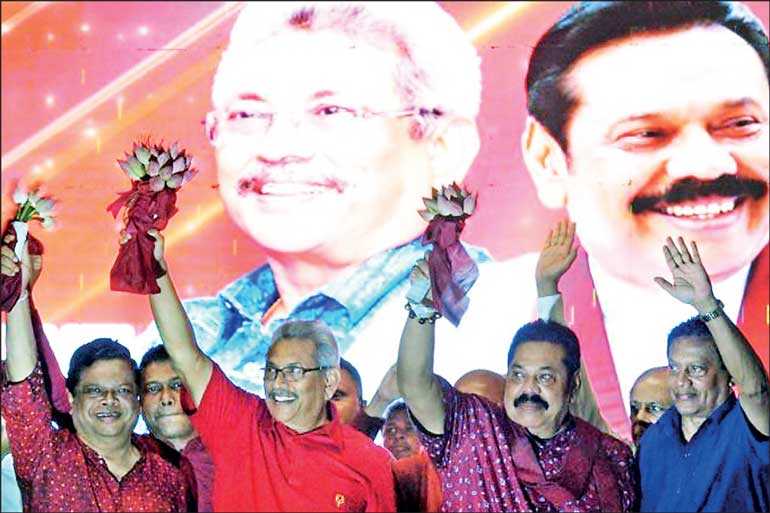Tuesday Feb 24, 2026
Tuesday Feb 24, 2026
Saturday, 1 August 2020 00:11 - - {{hitsCtrl.values.hits}}

Clearly, the ruling party ‘Pohottuwa’ commands the digital advantage. They have been in the business for more than three years. They have the digital resource advantage both official and unofficial. The others are catching up
“He who can make an exception is sovereign” – Carl Schmitt in 1922
 The pen was once mightier than the sword. In the age of the smartphone the tongue has taken over. The point of departure of this essay is digital electioneering amidst social distancing.
The pen was once mightier than the sword. In the age of the smartphone the tongue has taken over. The point of departure of this essay is digital electioneering amidst social distancing.
Thanks to the smartphone, behaviour tends to leave behind digital footprints.
COVID-19 has substantially altered the cacophony of the electoral process. The main contenders have made a definite, meaning full switchover to digital campaigning, micro-targeting and online mobilisation.
About 12 years ago I got a PC – not the black coated variety now overspreading in Hulftsdorp. It is something called a personal computer.
It was a maddening contraption which compelled my daughter Rashmi to gift me a clever compendium on how to get the basics right in the digital world. It was most appropriately called ‘Understanding Computers – a handbook for the perfect idiot’.
Thanks to that early fortuitous happening, I have followed the current electioneering process on YouTube, Facebook and most significantly on WhatsApp (Twitter eludes me still. I still cannot deal with ATMs. I fill a form and operate a savings account with a passbook).
The viral constraints on public rallies – humongous swarms of humans – has compelled political parties and candidates to focus on YouTube and most enjoyably one-on-one interviews.
It has produced a number of inquisitors who represent different political shades. My favourite is the bearded baldhead.
Clearly, the ruling party ‘Pohottuwa’ commands the digital advantage. They have been in the business for more than three years. They have the digital resource advantage both official and unofficial. The others are catching up. Thanks to the Election Commission, since the announcement of the date of elections some levelling of the playing field is thinly discernible.
I oppose the policies of President Gotabaya Rajapaksa. But that opposition does not diminish my capacity to make a rational assessment. Gotabaya is a very popular product.
There is a strong conviction amongst a large swathe of the populace that President Gotabaya Rajapaksa will take the right call for the country.
I think they are wrong. That is my opinion. I cannot prove them wrong. Only time will tell.
Time is always telling. Time never stops telling. But we don’t listen. Only when we are kicked in the derrière that we blame time for not telling it loud enough.
There is the world of reality. There is the world of fantasy. What separates the two is the wall of fallacy. You cannot attack the false while you are mired in fallacy.
Mangala Samaraweera has a point. I don’t know what he will do next. But he got out of a charade –meaningless and futile.
We must not confuse our choices. There is always a good choice and there is always a better choice. Then there is the best choice which we will not have during my lifetime because clientelist politics is too entrenched.
Politics is not about who does what but who gets what and how much and how fast. In this Parliamentary Election the Pohottuwa has leveraged digital technology to brand a single product – the President defender of the faith under whose benign guidance we will glimpse “vistas of prosperity and splendour”.
Neither Anura Kumara’s promise of integrity nor Sajith Premadasa’s capacity to bleed for the have-nots present a viable alternative Government.
If they on other hand wanted to preserve the democratic gains and arrest our slide into an autocratic rule, why are they contesting each other?
There is the ‘Peratrugami’ left fighting the Vimukthikami left. On the liberal democratic circus, the ‘Samagi’ party is fighting the ‘Eksath’ party.
All these well-meaning people have failed to tell voters what needs telling. If they vote for the thug, the extortionist, the child molester, the smuggler, the fraudster, they are in reality declaring their own oneness with those despicable deeds.
On YouTube I watched the chili powder dispenser pleading self-defence. The chap who started off with a suburban communication centre assured on YouTube that he possessed no tangible assets and that his current affluent home was the result of his good wife making lucky breaks in her business ventures.
Cynical mockery of obvious truths can no longer be dismissed as unfortunate gaffes that time would repair. The digital records will continue to haunt them but that will be only if the other side has the creative will to not let them forget.
The internet is a great instrument for citizen participation in democracy. The digital platform can either promote decency and truth or assault decency and subvert truth.
Recently I received a video clip on WhatsApp. It showed two young ladies engaged in passionate canvassing at the doorstep of a woman voter.
The conversation runs like this.
“We have come here not to promise you anything. We will not tell you that we will give you this or that. We have come to tell you that we must send a ‘Sinhalaya’ to speak on behalf of the Sinhala people. You will know about the national movement started by the late ‘Soma Hamuduruwo’. This is a person who was in it from its very inception. He was a ‘pioneer’ in the struggle to bring the President in to that high office.”
Then, the lady dressed in a smart saffron blouse pronounces the exotic Sinhala name of the candidate and says emphatically “we want only Sinhala Buddhist Catholic votes. Why? Because we strongly oppose Muslim extremism. We also oppose Tamil separatism. We want to a send a ‘Sinhalaya’ to Parliament to speak for the Sinhalese”.
The internet is a great instrument for citizen participation in democracy. The digital platform can either promote decency and truth or assault decency and subvert truth
Then she says the preference number of the candidate is number two. His ‘jathiya’ is number one. (www.youtube.com/watch?v=gsQSpT9WUx0)
I leave the reader to make sense out of the sales pitch of the young lady on behalf of the Sinhala nationalist candidate.
The video clip speaks for itself. Her quaint appeal for Sinhala Buddhist Catholic votes contains another phenomenon. The Sinhala Buddhist Catholic hybrid is an ethicised identity marker. It excludes non-Sinhala Catholics. It is an exciting avenue to be explored by scholars of social anthropology.
This is what I fear about this brand of political patriotism. There is nothing wrong with benign patriotism. As Yuval Noah Harari points out in his ’21 Lessons for the 21st Century’ there is indeed nothing wrong with patriotism. Every nation claims to be unique. Indeed, they are so.
The problem begins when patriotism morphs into chauvinistic ultra-nationalism. Instead of claiming my nation is unique the candidate seems to have persuaded his supporters that their nation is supreme.
As Harari points out, when a thousand people believe a narrative or a story for one month it is called fake news. When a billion people believe it for a thousand years it earns the sanctity of religion. “We are admonished not to call it fake news in order not to hurt the feelings of the devout and faithful.”
For better or worse fiction is among the most effective tools in humanity’s toolkit.
The world is what it is. It is not something we chose. It is a place where we must live, like it or not. And we must live with the lady in the saffron blouse in the video clip and her candidate.
This is all about the Parliamentary Election. In this election we must decide what we can do together and what we can do apart from each other.
All virtue is rooted in truth. Authoritarianism begins when we cannot separate truth from what is appealing now. The citizen who disputes truth beckons to tyranny.
When fascism says ‘the people’ it means ‘some people’. Fascism is the art of persuading people to follow a leader who undertakes to protect them from a non-existing enemy.
The fertile ground for fascism is a society riddled with inequality. In such a disturbingly dystopian society the miserable poor find truth to be too much to comprehend. The vulgarly rich find truth to be of too little consequence.